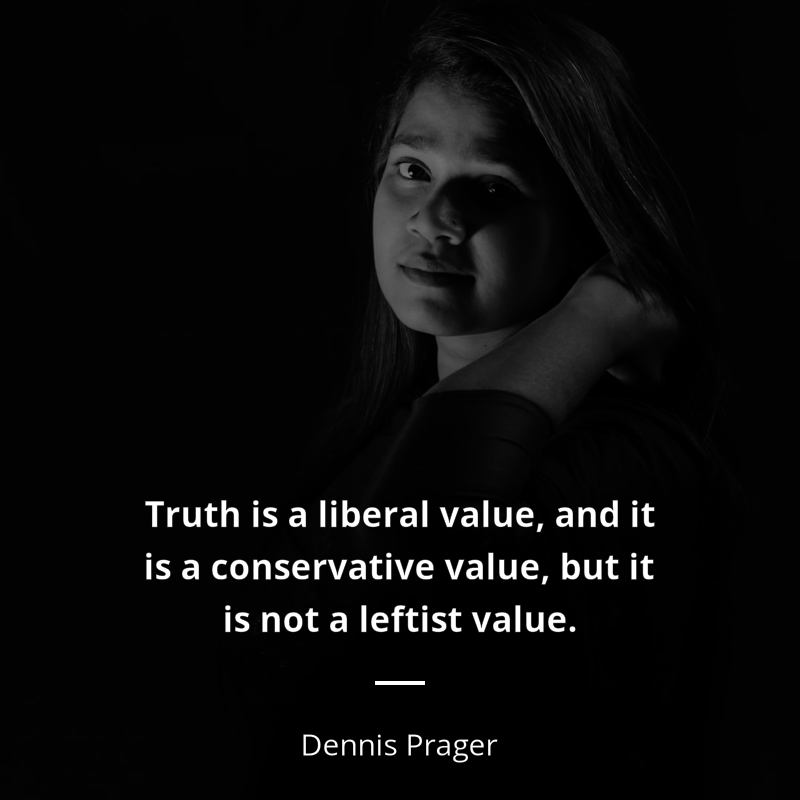“Truth is a liberal value, and it is a conservative value, but it is not a leftist value.”
Source: 2010s, Why Most Jews Aren't Bothered By The Times' Anti-Semitic Cartoon (2019)
Help us to complete the source, original and additional information
Dennis Prager 32
American writer, speaker, radio and TV commentator, theolog… 1948
Related quotes
2010s, South Korea’s Nationalist-Left Front (April 2019)

"The Situation with Tucker Carlson" on MSNBC (5 August 2005) http://www.msnbc.msn.com/id/8870977/
As of a Trumpet, 1968, p. 43
As of a Trumpet

"Trump nation tired of racial sadomasochism," http://www.wnd.com/2016/03/trump-nation-tired-of-racial-sadomasochism/ WorldNetDaily.com, March 3, 2016.
2010s, 2016

“Canada is sinking deeper and deeper into illiberalism--in the name of liberal values”
Twitter post https://twitter.com/McCormickProf/status/957353757259509761 (27 January 2018)
2018

A Little Conserva-tive (1936)
Context: Lucius Cary, Viscount Falkland, managed to make himself a most conspicuous example of every virtue and every grace of mind and manner; and this was the more remarkable because in the whole period through which he lived — the period leading up to the Civil War — the public affairs of England were an open playground for envy, hatred, malice, and all uncharitableness. … He could not see that there was any inconsistency in his attitude. He then went on to lay down a great general principle in the ever — memorable formula, "Mr. Speaker, when it is not necessary to change, it is necessary not to change."
Here we get on track of what conservatism is. We must carefully observe the strength of Falkland's language. He does not say that when it is not necessary to change, it is expedient or advisable not to change; he says it is necessary not to change. Very well, then, the differentiation of conservatism rests on the estimate of necessity in any given case. Thus conservatism is purely an ad hoc affair; its findings vary with conditions, and are good for this day and train only. Conservatism is not a body of opinion, it has no set platform or creed, and hence, strictly speaking, there is no such thing as a hundred-per-cent conservative group or party … Nor is conservatism an attitude of sentiment. Dickens's fine old unintelligent characters who "kept up the barrier, sir, against modern innovations" were not conservatives. They were sentimental obstructionists, probably also obscurantists, but not conservatives.
Nor yet is conservatism the antithesis of radicalism; the antithesis of radical is superficial. Falkland was a great radical; he was never for a moment caught by the superficial aspect of things. A person may be as radical as you please, and still may make an extremely conservative estimate of the force of necessity exhibited by a given set of conditions. A radical, for example, may think we should get on a great deal better if we had an entirely different system of government, and yet, at this time and under conditions now existing, he may take a strongly conservative view of the necessity for pitching out our system, neck and crop, and replacing it with another. He may think our fiscal system is iniquitous in theory and monstrous in practice, and be ever so sure he could propose a better one, but if on consideration of all the circumstances he finds that it is not necessary to change that system, he is capable of maintaining stoutly that it is necessary not to change it. The conservative is a person who considers very closely every chance, even the longest, of "throwing out the baby with the bath-water," as the German proverb puts it, and who determines his conduct accordingly. And so we see that the term conservative has little value as a label; in fact, one might say that its label-value varies inversely with one's right to wear it.... It covers so much that looks like mere capriciousness and inconsistency that one gets little positive good out of wearing it; and because of its elasticity it is so easily weaseled into an impostor-term or a term of reproach, or again into one of derision, as implying complete stagnation of mind, that it is likely to do one more harm than it is worth.

The Necessary Angel (1951), Imagination as Value
Context: What the poet has in mind... is that poetic value is an intrinsic value. It is not the value of knowledge. It is not the value of faith. It is the value of imagination. The poet tries to exemplify it, in part as I have tried to exemplify it here, by identifying it with an imaginative activity that diffuses itself throughout our lives.

Source: The Secret Oral Teachings in the Tibetan Buddhist Sects (1964)
Introduction, p. 26
Books, The Enemy At Home: The Cultural Left And its Responsibility for 9, 11 (2007)